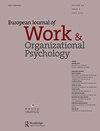行为意图重要吗?下班后工作相关信息通信技术使用的日记研究
IF 4
2区 心理学
Q2 MANAGEMENT
European Journal of Work and Organizational Psychology
Pub Date : 2023-06-23
DOI:10.1080/1359432x.2023.2225773
引用次数: 2
摘要
由于下班后使用与工作相关的信息通信技术(ICT)通常与负面结果有关,因此有趣的是,许多人仍然从事这种行为,通常是每天的基础。然而,定性研究表明,当人们有意识地计划从事这种行为时,信息通信技术的危害可能会小一些。利用行动调节理论,本文测试了以下假设:信息通信技术有时是一种有计划的行为,人们打算参与这种行为来应对与工作相关的刺激(例如,每日未完成的任务,每日工作量),当信息通信技术更有意或有计划时,这种行为的结果就不那么有害。我们对186名佛兰德员工进行了为期5天的日记研究(即每天两个测量点),以检验我们的假设。我们发现,每天未完成的任务——尽管不是每天的工作量——通过每天参与信息通信技术的意图与每天的信息通信技术呈正相关。此外,研究发现,参与信息技术的日常意图加强了而不是缓冲了日常信息技术与心理疏离之间的负相关关系。我们发现,在信息通信技术与工作-家庭冲突的关系中,参与信息通信技术的日常意向没有调节作用。讨论了理论和实践意义。本文章由计算机程序翻译,如有差异,请以英文原文为准。
Do behavioural intentions matter? A diary study on work-related ICT-use after work hours
Because work-related ICT use after hours (WICT) has often been linked to negative outcomes, it is intriguing that many people still engage in this behaviour, often on a daily basis. Yet, qualitative research suggests that WICT may be less harmful when people consciously plan to engage in this behaviour. Drawing on Action-Regulation Theory, this paper tests the assumptions that WICT is sometimes a planned behaviour that people intend to engage in in response to work-related stimuli (e.g., daily unfinished tasks, daily workload) and that the outcomes of this behaviour are less detrimental when WICT is more intended or planned. We tested our hypotheses using a 5-day diary study (i.e., two measurement points a day) among 186 Flemish employees. We found that daily unfinished tasks – though not daily workload – were positively related to daily WICT via daily intentions to engage in WICT. Furthermore, daily intentions to engage in WICT were found to strengthen, rather than buffer, the negative relationship between daily WICT and psychological detachment. We found no moderation effect of daily intentions to engage in WICT in the relationship between WICT and work-to-home conflict. Implications for theory and practice are discussed.
求助全文
通过发布文献求助,成功后即可免费获取论文全文。
去求助
来源期刊
CiteScore
8.00
自引率
2.30%
发文量
40
期刊介绍:
The mission of the European Journal of Work and Organizational Psychology is to promote and support the development of Work and Organizational Psychology by publishing high-quality scientific articles that improve our understanding of phenomena occurring in work and organizational settings. The journal publishes empirical, theoretical, methodological, and review articles that are relevant to real-world situations. The journal has a world-wide authorship, readership and editorial board. Submissions from all around the world are invited.

 求助内容:
求助内容: 应助结果提醒方式:
应助结果提醒方式:


